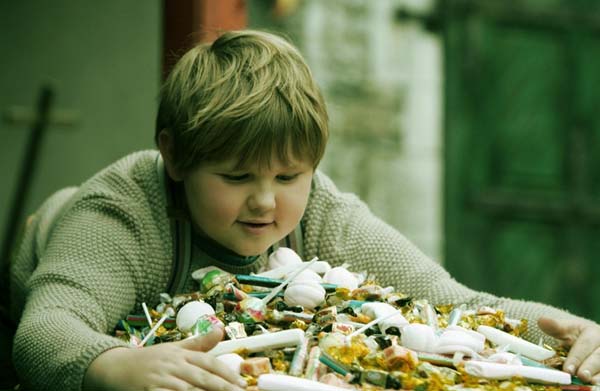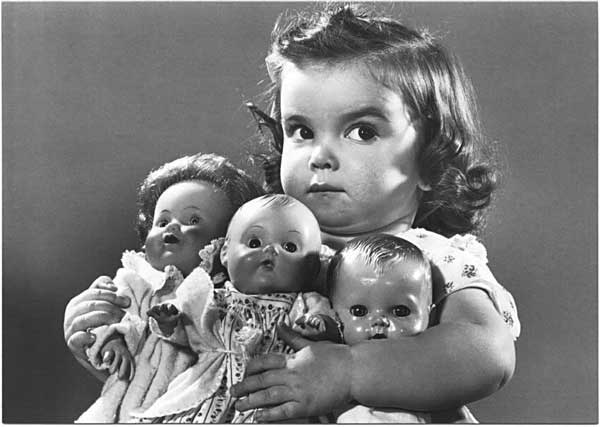Egoism is inherent in every person from birth. We can say that egoism is inherent in human nature itself. And if so, then the initial egoistic traits are manifested in people from childhood. A newly born child is already selfish. When he is capricious, screaming and crying - this can be considered the primary signs of egoism.

Although, according to psychologists, children's moodiness is not egoism as such, but just a normal reaction of the child, with the help of which he requires attention. In other ways, he still does not know how to communicate with the world around him. And here it is very important that the child does not cross a certain line beyond which the natural childish moodiness ends and the real childish egoism begins. Such a line is very unsteady and arbitrary: to cross it is easy, to go back is almost impossible.
More about the vagaries of children
So, children's whims are, for the most part, not yet selfishness, but only a way of a child's communication with the outside world. The main causes of childhood vagaries are known to every experienced parent:
- The child begins to be capricious, because he feels uncomfortable: he did not sleep, he is hot or cold, he is hungry;
- He may be capricious when something hurts him, his temperature rises, he feels sick — that is, the child is sick;
- The baby needs emotional communication with his parents, he wants to be picked up, talking and playing with him;
- He can also be capricious, being far from his mother (say, in kindergarten, with his grandmother, aunt, etc.);
- The child does not understand how to behave in the family. This happens when one of the parents behaves excessively severely with the baby, and the other, on the contrary, is excessively soft. In this case, the child cannot develop his own line of behavior, which is why he is capricious;
- With the help of whims, the child reacts excessively hard parental "no". The nature of every child has a desire to explore the world. Excessively strict parental inhibitions oppress this natural childhood desire. Trying to resist parental restrictions, the baby begins to act up;
- Everything ends with childhood whims when the parents are wrong about the child’s attempts to do something on their own. For example, the baby says the classic "I myself!" and trying to eat porridge on her own, still not able to hold a spoon. In principle, parents should strongly encourage the crumbs to strive for independent actions, and they, on the contrary, take away his spoon;
- A child can be capricious even when some disagreements and quarrels are observed in the family. Say, dad is quarreling with mom, older brothers and sisters are in conflict, mom is scolding older brother, etc. There can be many options. Such conflicts usually scare the baby, instill in him uncertainty, he ceases to understand his place and role in the family and does not know how to behave. Hence the whims.
Of course, there may be other reasons for the manifestation of children's vagaries. Sometimes whims can be associated with the age psychology of the child. In other cases, they may be a protest to the wrong actions of the parents. And sometimes a childish whim is already the primary manifestation of childish selfishness.
We also read: How to react and deal with the vagaries of a child (child from birth to 1 year)
Whims are followed by children's tantrums ...
If you constantly ignore children's whims, then very soon they can develop into full-fledged childish egoism. Perhaps the most striking manifestation of childish selfishness is tantrums. Everyone probably saw and knows what it is. Having been denied something, the child begins to cry loudly, scream, throw objects, beat the elders, destroy everything that comes to hand, ride on the ground, and sometimes inflict physical injuries on himself.

According to psychologists, children's tantrums have their own logic. Sometimes hysteria can be a psychological reaction of the baby, who thus tries to make it clear that he needs the support of adults. That is, he psychologically begins to feel so uncomfortable that he is intuitively forced to resort to at least hysteria. At the same time, such behavior can be both in a child from a completely prosperous family, and in a child who grows up in a family unsuccessful.
However, for the most part, childhood hysteria occurs for completely different reasons. Often in this way the child tries manipulate adults. That is, he wants to subordinate them to his influence and achieve from them everything he wants. Hysteria is a kind of “trial ball”, with the help of which children intuitively determine how adults, as they say, will be led to their requirements. In fact, hysteria is the most striking manifestation of childish selfishness.
That’s why children's hysteria is always a play game to the public. Having been denied his “want,” the child takes action. The more attention is paid to a child who has become hysterical, the longer and more colorful the hysterical seizures are. And vice versa: if in this case you do not pay attention to the child, he very soon calms down on his own. Intuitively, he understands that this method of influencing adults did not bring success, which means that other methods must be sought.
We also read:
Causes of tantrum in children of different ages. How to prevent tantrum in a child? Psychologist's advice on how to deal with childhood tantrums - https://kid.htgetrid.com/en/eto-polezno-znat/kak-borotsya-s-detskoy-isterikoy-sovetyi-psihologa.html
How parents help their child become selfish
Alas, this is so: often parents themselves, without suspecting and not wanting it, help their child grow up selfish. Firstly, this is due to improper parenting. Secondly, due to some specific character traits of the parents. Here are just some of the most common parental mistakes that can make a child grow up as an inveterate egoist:
[sc name = ”rsa”]
- Parental love, which is called "blind." Mostly “blind” love single mothers love their children. However, there is “blind” love in complete families. “Blind” love is the fulfillment by parents of all children's whims and desires, both useful for the child and harmful. This is detrimental to the fragile children's psyche. Due to the “blind” parental love, the child very soon becomes a complete egoist. “By the way, most of the dangerous criminals and maniacs in childhood were corrupted precisely by “blind” parental love ”;
- Excessive parental care. In fact, this is a variation of the same "blind" love. The child needs to be given reasonable independence. If the parents strive to do everything for the child (sometimes this can continue until he comes of age), then this also makes him an egoist;
- The child lacks sincere parental love. For normal development, children need constant contact with their parents - both bodily and spiritual: hugging, stroking the head, kisses, affectionate look. If this is not the case, then the child may become isolated. Or - to demand all this with the help of tantrums and other selfish tricks;
- Parents themselves are selfish. It is well known that a child tries to imitate his parents. And if mom or dad (or even both at the same time) are selfish, then imitating them, the child himself becomes the same;
- Excessive stimulation of the child, encouraging his good behavior. Often, parents, acting, as they see it, out of good intentions, encourage any good deed of their children: money, gifts, other actions that the child likes. Very soon, the child begins to understand such parental logic, and tries to seem good only when he hopes to receive encouragement for this. Being good “on order” is a form of egoism;
- The influence of external information sources on the child. Not only parents raise a child, but also the world in which the child lives. It used to be called "street influence." Now - the child receives most of the information from television, the Internet, films, etc. If parents do not pay enough attention to this and, as they say, do not filter the information received by the child, this can also lead to the child becoming a selfish person.
Stages of childish selfishness
Children's egoism is usually divided into stages - in accordance with the age of the child.
- The first stage begins from birth and lasts up to about 3 years. This stage can be called "natural egoism." At this age, the child, as he can, demands the satisfaction of his natural needs: to be fed, swaddled, washed, warmed, cured. There is nothing to worry about in such egoism.
- The second stage in the development of childish egoism coincides with the preschool age of the child. At this age, the child can consider himself almost the center of the universe and demand the rigorous fulfillment of all his whims. If they are not fulfilled, he may begin to have a tantrum and other inappropriate forms of behavior. This especially happens when a child is raised incorrectly.
- The third stage is the school age of the child. The child enters a new world for him, where he, one way or another, has to fight for a place in life and prove to others his role in this world. Becoming an egoist is much easier than loving your neighbor. And if a child fell into this world, being already an egoist, then in this case his egoism will only grow stronger. Which will certainly affect his relationship with his parents, worsening such a relationship.
The child is selfish and lazy: Why do children become selfish, do not want to help, do not spare their parents, do not understand. Where does the consumer attitude to life come from?
How to resist children's whims and tantrums
Of course, with childhood whims, and, especially, hysteria, we must fight. Otherwise, an inveterate egoist will almost certainly grow out of a child, capable of harming not only himself, but also those who are close to him. But to fight, you need to understand the reasons. There may be several:
- Children's whims can occur due to fatigue, poor health, because of uncomfortable clothes, the environment, and increased sensitivity to any manifestations of nature: light, smell, color, sounds;
- If a child has tantrums when he is with someone specifically from adults, it means that he is most likely uncomfortable with this adult person. Usually this happens when a child is left alone with an adult who prohibits almost everything, while some other adult, on the contrary, allows everything (A friendly family will turn the mountain, or how to overcome differences in parenting);
- If the child’s tantrums happen often, then this may indicate that he has something wrong with the nervous system.
Knowing the basic conditions under which a child falls into hysteria, it is easy to determine how it can be resisted, and better - how to prevent it:
[sc name = ”ads”]
- If parents see that their child is ready to fall into hysteria, you should try to switch his attention to some other topic. Moreover, this must be done calmly, sympathetically and benevolently, in no way by passing to screams, threats and punishment;
- It is necessary to clearly and clearly make clear to the child what he can and cannot do. In no case should “not be” and “can” be interchanged and give way to the requirements of the child;
- When a child is naughty or hysterical, you should not leave him alone. However, do not console him (it depends on the cause of the tantrum, read below), lift from the floor, otherwise the child may perceive this as a manifestation of parental weakness, and then the situation may worsen. The most correct thing in this situation is to continue to do some sort of business, while monitoring the child. Usually, the child eventually understands that in this way he will not achieve anything, and calms down on his own.
- However, children's tantrums can be for various reasons. For example, if a child falls into hysteria due to the fact that his mother is not nearby (and this is a fairly common case), then, apparently, it would be more correct to pity him and assure him that his mother will be soon. The same is more reasonable to do if, say, a child falls and is hurt. Or - if some stranger unjustly offended him. Or - when he was afraid of something or someone. In all these cases, the baby, apparently, will calm down faster if he is hugged, sorry and expressed his sympathy;
- After the child has calmed down, you need to talk to him “heart to heart”, explaining to him that he behaved badly and that you can’t behave like that.
Of course, these are far from all recommendations. The main thing here is to make the child clearly understand that no matter how capricious he is, parents will not yield to him in anything. If this is not explained to him, then most likely he will continue to try to manipulate his parents in this way. But if he understood and, moreover, stopped his behavior, he should be praised.
We also read: How to deal with childhood hysteria: advice from a psychologist
How to overcome childish selfishness
It will be great if parental efforts to eradicate egoism in a child have been successful. And if, as they say, "the train has left"? Egoism is a human feeling that does not stand still, expands, deepens, and ultimately captures the whole person. Therefore, urgent measures are urgently needed, the purpose of which is to overcome childish egoism. Here are some of these measures:

- It is necessary to accustom the child to independence. Starting from three years, the baby may well tidy up in his room, dress independently, and perform other simple duties;
- Gradually, it is necessary to expand the circle of those things that a child can do independently. Moreover, it is necessary that he complete each of these cases. A child should be praised for completed work. This is best done in the presence of all other family members;
- Very quickly and effectively, the child gets rid of his own selfish inclinations, if he is given a clear understanding of how bad it is to be selfish. Say, his mother always woke him to school, collected his briefcase, stroked his school uniform, etc. It is clear that the child is used to it.But once mother didn’t intentionally do this, the young egoist overslept for school, as a result of which he had certain difficulties and troubles. Such a “cure for the contrary” of almost anything will make you think that selfishness is bad;
- It should be as often as possible to be interested in the child's affairs in school, kindergarten, sports section, etc. Moreover, one should ask him about friends, classmates, acquaintances. If a child is worried about them, this means that he will soon "grow out" of his childhood egoism;
- When there are several children in a family, nobody around the beginning egoist “dances”, does not indulge all his desires and does not make him a home idol. That is, no one gives the child the opportunity to feel exceptional, which means that he will not have the opportunity to manifest selfishness. In addition, in large families, children usually live together, share with each other and help one another. Living together and caring for each other is a very effective prevention of childish selfishness;
- Parents must act especially harshly if the child shows his selfishness towards them. Under no circumstances should parents be allowed to push around. The commonly used expression "live for a child" is extremely wrong. Because in the future such a child will also live exclusively for himself: that is how he was taught. Therefore, in communicating with children, you must observe your own "I", while not losing love for them.

A few words as a result
Let us say it again: childish egoism, as well as universal egoism, is, in principle, quite understandable and normal. However, at the same time, there is egoism “healthy” and “unhealthy”. “Healthy” egoism helps a person to survive in this world. “Unhealthy” egoism, that is, exaggerated, painful attention to one’s person, on the contrary, harms a person, and even harms those who live next to him.
Human egoism is formed in childhood. And here parents face the most important task - to prevent their child from developing exactly the “unhealthy” egoism in himself. It is easy to develop, to eradicate is almost impossible. Here it is necessary to act in rather harsh ways, which were mentioned above. Otherwise, in the future, society will be engaged in the cure of the matured egoist, moreover, in a more severe way.
We also read:
- What if the child does not obey you?
- How to raise children: carrot or stick?
- 10 tips to stop yelling at your children
- 10 secrets of raising an obedient child: how to teach children to respect and hear parents
- How to re-educate a spoiled child (how to understand that a child is spoiled: signs and causes)
My child is an egoist, advice from a psychologist
Mom’s school: Is the only child an egoist?









In fact, we are all egoists, everyone considers himself the main person on this planet / universe and this is normal, this is our perception of the world, it’s another matter that upbringing corrects the degree of this egoism and the main thing is not to go too far, because part of egoism is good, it helps to break through in life. I’m not an ideal mother, I react differently to whims, sometimes I shout, but I try to explain more often when a child crosses the line of what is permitted.
I had a very calm and happy pregnancy. And in this I see the reason that my child grew up without any whims, and even more so - tantrums. I myself sometimes do not believe in it, but I cannot recall a single case. so that he insists on something, screams, falls to the floor. Perhaps this is his innate temperament.
I didn’t even think that I was growing an egoist. The second daughter, in our family, is the main one. She controls her whims both me and her husband. If the eldest son didn’t give her something, we have such hysteria at home that it’s easier for her to give away what she wants, be it an expensive telephone, fragile crystal. While she is small, we will break her character and correct her mistakes.